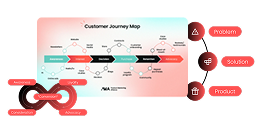In B2B software, many founders and marketers are eager to scale their marketing efforts. However, diving into marketing activities without first establishing a solid product marketing foundation is a common and costly mistake.
In this article based on my interview with Anastasia Albert featured in my Amazon Bestseller Product Marketing Wisdom, we’ll explore the importance of mastering product marketing fundamentals, especially for B2B software founders, and why these principles should be the cornerstone of any marketing strategy.
1. Establishing a strong product marketing foundation
Before rushing into running marketing campaigns, creating ads, and developing promotional strategies, it’s critical to build a strong foundation for your product marketing engine.
The key to long-term success in product marketing lies in ensuring that you have a clear understanding of your target market, your ideal customers, and the messaging that will resonate with them.
The essential building blocks of product marketing include:
- Defining your Ideal Customer Profile (ICP) and personas
- Understanding the buying decision process
- Positioning your product effectively
- Crafting clear and compelling messaging
Without these fundamentals in place, everything else in the marketing process can fall apart. For instance, if you don’t have a clearly defined ICP, you risk trying to appeal to everyone, which often leads to reaching no one.
Similarly, if your messaging focuses too much on product features instead of the value your product brings to customers, your marketing will fail to generate the urgency needed for sales.
By prioritizing these core elements, you can ensure that your marketing efforts are effective and aligned with your target audience’s needs and expectations.
2. Defining your ideal customer profile (ICP) and personas
One of the first and most crucial tasks for any product marketer is to define the ICP and personas. This is where many B2B marketers falter.
It’s easy to fall into the trap of thinking your product can serve everyone, but in reality, trying to appeal to all markets dilutes your marketing efforts and makes it harder to stand out.
Your ICP should represent the type of company that benefits most from your product. It’s not just about the size or industry of the company, but also the specific challenges your product solves for them.
Once you have a clear picture of your ICP, you need to go further by defining personas within that market. Personas are the individuals within a company who influence or make purchasing decisions.
For example, in the B2B space, this could be a decision-maker like the Chief Marketing Officer (CMO) or a user like a marketing manager. By defining your personas, you can tailor your messaging and content to resonate with the specific pain points and goals of each persona.
Understanding the buying decision process is also critical. You need to know how your personas research products, who influences the purchasing decision, and what factors lead them to choose one product over another.
This insight allows you to design a marketing strategy that aligns with the customer journey and helps move leads toward conversion.
3. Positioning and messaging: The power of clear communication
Once your ICP and personas are defined, the next fundamental area is product positioning and messaging.
Positioning is a key part of making your product stand out in a crowded market. Positioning is all about defining how your product is different and more valuable than competitors. It should communicate why your solution is the best fit for your target audience’s needs, challenges, and goals.
When positioning your product, it’s essential to focus on the benefits your product provides, rather than just the features it offers.
Customers are more interested in how your product solves their problems and improves their lives, rather than the technical details of how it works. Marketers often make the mistake of focusing too much on the "what" (features) rather than the "why" (value).
Once you have a strong positioning strategy, it’s time to craft your messaging. Your messaging should consistently communicate the value your product provides in a way that resonates with your target audience.
The messaging should be clear and compelling, as this clarity is crucial for generating urgency and excitement in the sales process.
4. Deep dive into the industry and market research
Another essential aspect of product marketing is immersing yourself in your industry. Too many marketers in the B2B space fail to deeply understand the market they are operating in, which leads to missed opportunities and ineffective strategies.
Product marketers should invest time in conducting thorough market research. This includes:
- Customer interviews to uncover pain points, needs, and motivations
- Talking to internal stakeholders to understand the company’s vision and product capabilities
- Engaging with industry experts to stay informed about trends and innovations
- Reading analyst reports to understand the broader market dynamics
- Monitoring competitors to identify gaps in the market or areas where you can differentiate your product
This kind of research is crucial for gaining a nuanced understanding of the market landscape. By talking to customers, industry experts, and stakeholders, you can uncover insights that will help you shape a more targeted and effective marketing strategy.
Additionally, keeping an eye on competitors allows you to spot opportunities to position your product more strategically.
5. The power of curiosity in product marketing
A critical trait of successful product marketers is curiosity. Product marketers should not take things at face value.
Instead, they should actively seek to understand the customer’s perspective, ask questions, and dig into the nuances of the market.
Product marketing is about understanding the market and its needs, and this requires a deep level of curiosity. By immersing yourself in the industry, talking to customers, and continuously asking questions, you can develop deeper insights that will lead to better product development, messaging, and sales success.
When marketers dig deeper into the market dynamics and customer pain points, they can uncover opportunities for innovation and differentiation.
This curiosity-driven approach helps product marketers develop strategies that resonate more effectively with their target audience and ultimately lead to better product-market fit.
6. Mastering the fundamentals for long-term success
In summary, mastering the core principles of product marketing is essential for long-term success. While it may be tempting to jump on the latest marketing trends or rely on quick-fix tactics, focusing on the fundamentals is the key to building a sustainable and effective marketing engine.
By taking the time to define your ICP, create detailed personas, understand your customers’ buying decision processes, and position your product effectively, you set yourself up for success.
Additionally, investing in industry research and maintaining a curious mindset ensures that you stay ahead of the curve and continuously refine your marketing strategies to meet evolving customer needs.
Product marketing is not just about positioning a product; it’s about understanding the market dynamics, developing effective messaging, and creating urgency that drives sales.
By focusing on the basics and immersing yourself in your industry, you’ll be better equipped to craft compelling messages and deliver value to your target customers. These fundamentals form the backbone of any successful product marketing strategy.
So, remember: getting the product marketing fundamentals right is the key to scaling your marketing efforts effectively and achieving long-term success.
Get Product Marketing Certified
Get the industry insights, expert tips, and proven strategies you need to excel as a PMM. With Product Marketing: Core, your future is bright.
From pricing, market research, and OKRs to personas, positioning, and go-to-market, Product Marketing Core has it all.
You’ll learn how to embody the voice of the customer.
You’ll nail the art of getting products to market and keeping them there.
And you’ll walk away with career-enhancing frameworks – all at a time that suits you.






.png)
.png)










 Follow us on LinkedIn
Follow us on LinkedIn



.svg?v=3bd81ea3cb)